Mum couldn’t eat pizza any more because she had pulled her teeth out one night a while ago (which is another Mum story). So she set out before dawn yesterday morning in search of more celestial food. She went alone, leaving her worn and wracked body behind.
Mum was not born to grow old, and yet she lived to be 90 with grace, anger at times, and some bewilderment.
“How did I get to be so old, Jamesie?” she asked not long ago.
I urged her to get up and walk to help her failing legs. But she was in pain and she was stubborn.
“They won’t let me walk here,” she said.
“Who won’t let you walk?" I asked incredulously.
“The people who run things,” she answered mysteriously.
“A woman comes here every morning for three hours, and she would be happy to help you walk.”
“I don’t feel like walking in the morning.”
“Well, we can ask her to come in the afternoon.”
“Oh . . . I don’t feel like walking in the afternoon either.
“Anyway,” she added, “all the people here tell me I look 50.”
“Fifty?”
“Well,” she conceded, “maybe 60.”
And in truth, she had barely a wrinkle on her face.
We were silent for a while, and then she said,
“Now I live only in my dreams?”
“What are your dreams?” I asked.
“Whatever I want them to be.”
“How are they?”
“Wonderful,” she said, as a smile came to her lips and she closed her eyes.
